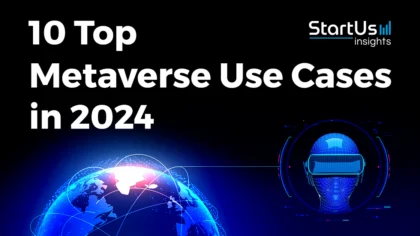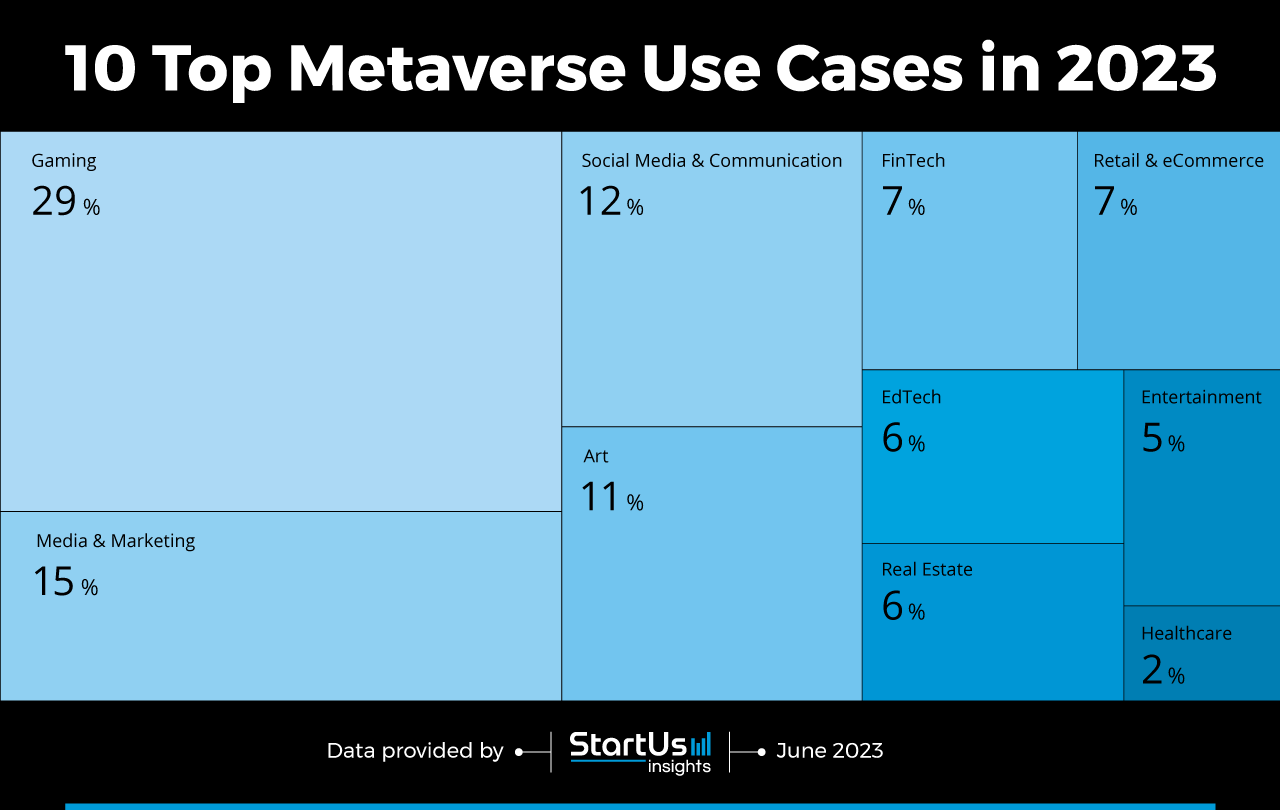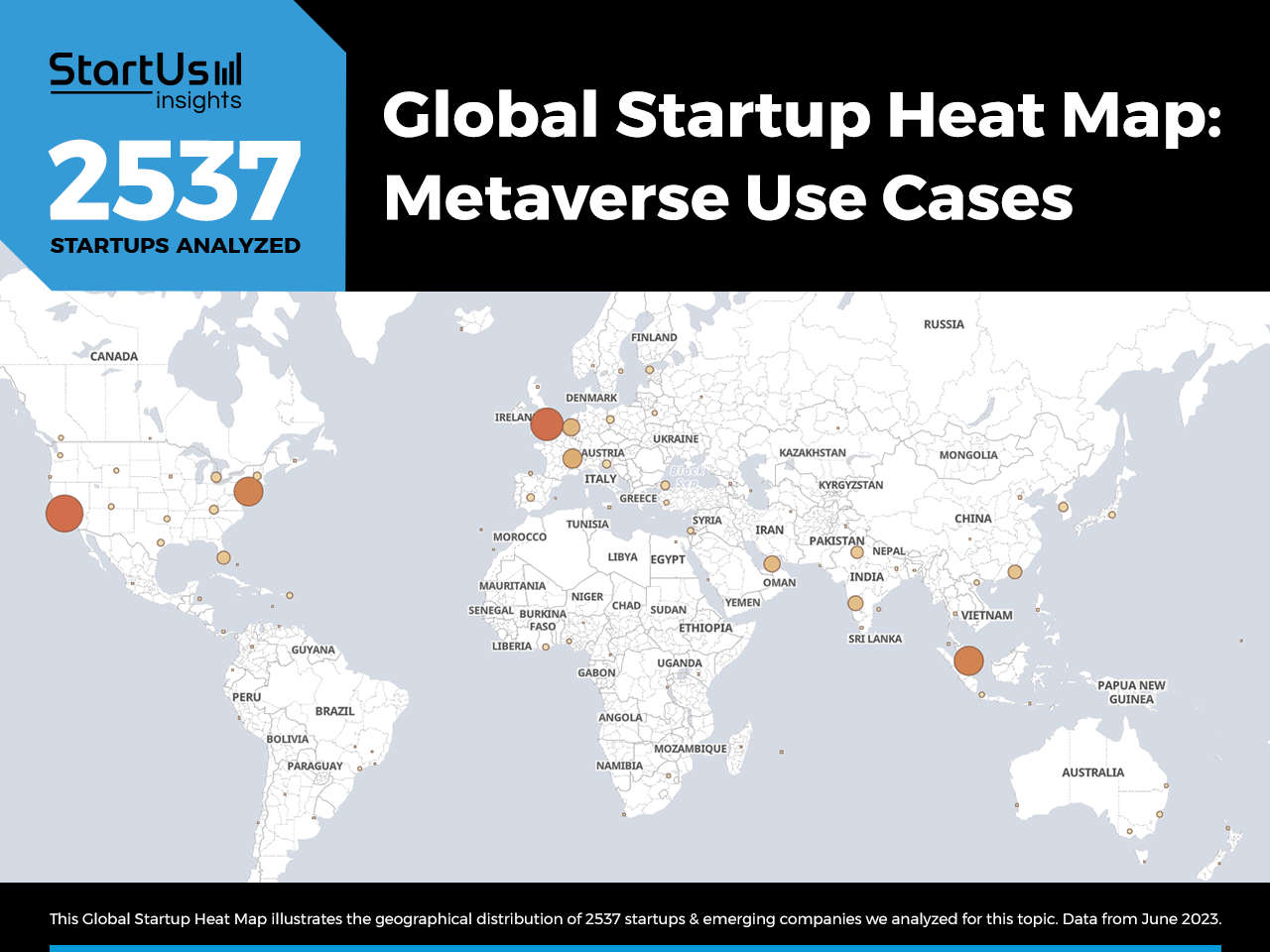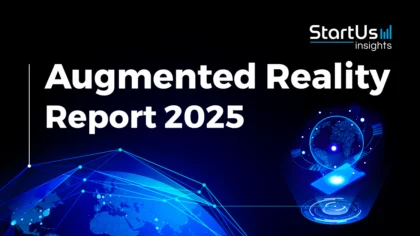Accelerate Productivity in 2025
Reignite Growth Despite the Global Slowdown
The metaverse is a vision of a future where you can connect, create, and explore in immersive virtual worlds. For this, metaverse uses virtual reality (VR), cloud-based IT infrastructure, spatial computing, and more. But how can it transform lives, work, and entertainment and what are its real benefits?
In this post, we will discuss the 10 top metaverse applications and use cases in 2023 and 2024 across different domains and industries. You will discover how the metaverse can enhance your creativity, productivity, entertainment, education, socialization, and more. Read more to explore how metaverse applications advance your business.
Tree Map reveals the Impact of the Metaverse Applications on 10 Industries
The Tree Map below illustrates the applications of metaverse across 10 industries in 2023 and into 2024. The metaverse transforms gaming by providing immersive experiences and virtual worlds. In media and marketing, it opens up new avenues for content creation and personalized advertising.
Social media and communication also leverage the emergence of virtual communities and interactive experiences. The art industry is deploying immersive reality platforms to drive engagement and sales. Additionally, fintech companies utilize the metaverse for secure financial experiences. The retail, eCommerce, education, real estate, entertainment, and healthcare industries use the metaverse to deliver enhanced experiences and personalized services.
Ultimately, the metaverse brings together virtual reality, AI, blockchain, and augmented reality (AR) to create a digital landscape. This changes the way people engage, collaborate, and interact, blurring the boundaries between the real and virtual worlds.
Global Startup Heat Map covers 2537 Metaverse Companies
The Global Startup Heat Map below highlights the global distribution of the 2537 exemplary startups & scaleups that we analyzed for this research. Created through the StartUs Insights Discovery Platform that covers 3 790 000+ startups & scaleups globally, the Heat Map reveals that the US, the UK, and Singapore have a high concentration of metaverse companies.
Below, you get to meet 10 out of these 2537 promising startups & scaleups as well as the solutions they develop. These metaverse examples are hand-picked based on criteria such as founding year, location, funding raised, & more. Depending on your specific needs, your top picks might look entirely different.
10 Top Use Cases of Metaverse in 2023 & 2024
1. Gaming
The metaverse is revolutionizing the way games are developed, distributed, and experienced. Game developers leverage the metaverse to create expansive and interconnected virtual worlds, enhancing immersion and player engagement. Additionally, metaverse-enabled gaming environments provide opportunities for social interaction, fostering multiplayer collaboration and competition. For example, Fortnite hosted virtual live concerts in collaboration with celebrities and brands.
Further, the metaverse allows for in-game economies and monetization models through virtual asset trading and digital goods marketplaces. To aid this, the gaming industry is leveraging low-code tools, like the Unreal Engine and Blender, to create games for the metaverse. Advances in VR hardware, the new Apple VR headset for example, further improves how gamers access the metaverse.
Metaverse integration with live events and eSports will also introduce innovative gaming experiences and enhance spectator engagement, enabling connected gaming communities.
UnicusOne offers Web3 as a Service (WaaS)
UnicusOne is a UAE-based startup that provides web3 as a service for the gaming industry. The startup’s solutions include a non-fungible token (NFT) marketplace and storefronts, metaverse integration modules, a payment gateway, and more. These solutions allow game developers to accelerate deployment in web3, make apps metaverse-ready, and support web3 payments. As a result, the startup’s multi-chain NFT ecosystem enables decentralized, scalable, and secure web 3.0 applications by tokenizing both real-world and metaverse assets.
2. Media & Marketing
Content creators and marketers leverage the metaverse to deliver highly engaging and interactive experiences to their audiences. It offers opportunities for virtual events, conferences, and exhibitions, enabling brands to reach global audiences and foster meaningful connections. Additionally, applications of the metaverse in the media and marketing industries enable immersive storytelling and branded experiences.
This enables media and marketing companies to captivate consumers in unique and memorable ways. Advertisers also apply product placement and integration in virtual environments to deliver targeted and personalized campaigns. Further, metaverse worlds function as sources for data analytics and consumer insights. This improves audience understanding and enables personalized content strategies.
Embracing the metaverse in the media and marketing industry thus enhances engagement and delivers impactful brand experiences.
GEEIQ enables Data-led Metaverse Marketing
GEEIQ is a UK-based startup that delivers data-led metaverse marketing. The startup’s platform combines and cleans the data from the metaverse, including games and NFTs, to identify marketing partners and benchmark strategies against competitor performance. These digest metrics allow brands to identify growth opportunities and stay on top of branded metaverse activities. The platform’s dashboard also allows marketers to compare key metrics and optimize current and upcoming partnerships, increasing addressable audiences.
3. Social Media & Communication
Since the metaverse is built around the idea of collaboration, there is a growing interest in social media platforms in virtual worlds. Meta’s or Facebook’s Meta Horizon is already available for users to explore and interact with other users. Virtual reality hardware applications in metaverse also increase the immersion of interactions for users.
With these benefits, brands, and influencers are able to host virtual events, product launches, and interactive experiences effectively. This enables them to connect with their audiences on a deeper level. Integrating the metaverse in social media and communication thus enables personalized and targeted communication, new revenue streams, and enhanced audience engagement. Further, this enhances social interactions, enables global connectivity, as well as improves accessibility and inclusivity.
Metafluence builds a Social Metaverse
Metafluence is a UAE-based startup that makes a social metaverse. The startup allows users to secure virtual properties near brands and influencers in its metaverse. These properties are owned as NFTs. The metaverse also allows users to host public and private events to create new revenue opportunities.
4. Art
Artists utilize the metaverse to create and showcase their artworks in immersive virtual environments. This allows them to reach global audiences and break free from physical limitations. Galleries and art institutions also host virtual exhibitions for visitors to explore artworks and interact with them. Other use cases of the metaverse in the art industry include augmented exhibition spaces, virtual art marketplaces, as well as artistic preservation and archiving, among others.
Art exhibitions enhance visitor engagement by augmenting on-site activities with metaverse while virtual marketplaces provide artists a more transparent channel to generate revenue. Additionally, studios are moving the preservation and restoration of artworks to the metaverse as digital archives and interactive experiences for future generations.
To aid these metaverse applications in art, companies are creating tailored platforms to support artists and art institutions. Integrating the metaverse in the art industry thus offers opportunities for artistic innovation and global accessibility.
ArtMeta advances the Digital Economy of Artists
ArtMeta is a metaverse startup that aids the digital economy of artists. The startup collaborates with artists, galleries, curators, institutions, and digital virtuosos to create virtual environments. Moreover, ArtMeta utilizes blockchain-powered NFTs to build its metaverse for fine art. Its platform and token, $MART, also provide artists and galleries with the tools to participate in the NFT market. This ensures transparent transactions and improved sales for artists.
5. FinTech
Transitioning the operations of banks and non-banking financial companies (NBFCs) to the metaverse improves customer experiences and drives operational efficiency. VR-enhanced banking and financial platforms provide immersive interfaces for users to interact with their accounts, make transactions, and access personalized financial insights.
The metaverse also enables virtual meetings and collaboration with customers, improving remote communication and streamlining decision-making. Moreover, this allows customers to engage with digital assets in a secure and interactive environment, benefitting virtual asset management and trading.
Apart from driving customer satisfaction, the fintech industry is leveraging metaverse apps to improve financial education, training, infrastructure security (through encrypted transactions and real-time fraud detection), and regulatory compliance.
Project Larix makes a Metaverse-based Finance Protocol
Project Larix is a metaverse startup that develops a metaverse-based finance protocol on Solana. It leverages a dynamic interest rate model and capital-efficient risk management pools, including a broad selection of collateral types, crypto tokens, and stablecoins. The protocol’s pool-based collaterals and dynamic ratio optimizer enable instant loans at zero costs.

6. Retail & eCommerce
Metaverse commerce offers customers a highly immersive and interactive shopping environment, bridging the gap between physical and online stores. Brands create virtual showrooms that allow customers to explore and customize products virtually. The metaverse also facilitates social shopping experiences where users interact with friends and seek recommendations in real time.
Metaverse platforms present opportunities for virtual try-ons, thereby enhancing shopping experiences and reducing product returns. Metaverse developers thus offer app development services, virtual reality hardware, and data analytics solutions tailored for retailers and eCommerce businesses. They accelerate the development of metaverse apps and, in turn, reduce the time to market.
Through these solutions, retail businesses improve the performance of their online stores while eCommerce channels deliver personalized services, improve influencer collaboration, and more.
VastReality makes a Virtual or V-Commerce Platform
VastReality is a French startup that develops a v-commerce platform. It provides businesses with the necessary tools to build VR stores and scale their presence in the metaverse. Additionally, the platform features a no-code architecture, payment integration, and AI-powered product recommendations. It also supports social commerce by allowing customers to invite friends or family without VR hardware during shopping, increasing checkouts. This way, VastReality enables merchants to reach more customers and sell better in the metaverse.
7. EdTech
Metaverse platforms enable students to engage with subjects in an experiential manner, facilitating deeper understanding and knowledge retention. This also provides opportunities for remote learning by connecting students and educators globally and overcoming geographical barriers. Virtual classrooms within the metaverse offer collaborative learning environments, fostering student interaction and teamwork.
Additionally, the metaverse allows educators to create simulations, virtual experiments, and interactive lessons, making education more engaging and dynamic. Consequently, metaverse-powered activities promote adaptive learning and innovative pedagogical practices, enhancing educational outcomes. The educational metaverse further reduces the costs associated with physical resources through digital libraries, also improving access to knowledge.
Virtuosi VR delivers Interactive Educational Experiences
Virtuosi VR is a US-based startup that offers interactive educational experiences for the life sciences industry. The startup’s on-demand digital learning solution uses VR-based video, graphics, and picture-in-picture video to offer courses. The startup’s library includes courses for advanced therapy medicinal products (ATMPs) and gene therapy products (CGT).
Its virtual learning environment allows learners and trainees to explore and learn in Virtuosi VR’s virtual manufacturing and laboratory facilities. This allows research institutions to ensure cost-effective and high-performance training sessions while removing real-world risks to production assets.
8. Real Estate
The metaverse transforms how properties are showcased, bought, and sold. It provides immersive and interactive experiences that enable potential buyers to explore properties remotely. Virtual property tours offer a real sense of space and allow them to better visualize properties, helping buyers make informed decisions.
Additionally, the metaverse allows real estate professionals to showcase properties to a global audience, eliminating geographical constraints and expanding market reach. Virtual staging thus enables cost-effective and flexible property presentation. These applications of the metaverse streamline property buying, enhance buyer engagement, and increase conversion while reducing costs and saving time.
Blockee makes a Virtual Real Estate Marketplace
Blockee is a Thai startup that creates a virtual real estate marketplace. The startup’s NFT marketplace requires buyers to set up an Ethereum wallet. It features automated price estimates, map-based searches, and more to streamline the buying and selling processes. The marketplace also aggregates NFT land from virtual worlds and web3 for traditional real estate investors to use virtual plots as investment vehicles.
9. Entertainment
Metaverse opens up new opportunities for entertainment businesses to broaden their reach and generate new revenue. Audiences immerse themselves in virtual worlds, participate in interactive narratives, and engage with characters and storylines in the metaverse. Companies host live events, concerts, and performances within virtual environments, transcending physical limitations and reaching global audiences.
Additionally, the metaverse fosters social interactions and virtual communities, allowing audiences to better connect, collaborate, and share experiences. This enables new creative avenues for content creators and increases revenue. Innovative storytelling and narratives using VR also drive fan engagement and enable experiential marketing.
Stageverse builds 3D Social Places
Stageverse is a US-based startup that creates a no-code web3 metaverse platform to build elevated 3D social places for events, concerts, live streams, and more. It allows creators and brands to build metaverse venues and host interactive 3D experiences. The platform also supports high-fidelity avatars and venues as well as spatial audio conversation for better immersion.
Further, the startup provides tools to create and sell virtual goods, e-commerce, ticketing, and more to generate revenue. This allows entertainment businesses to mitigate capital and time-intensive in-house product development.
10. Healthcare
The healthcare industry leverages the metaverse to improve surgical planning and medical training. Immersive and realistic medical simulations allow healthcare professionals to practice procedures and treatments in a safe and controlled environment. For this, medical professionals utilize tailored VR hardware and training programs, enhancing medical education and providing hands-on experiences.
Moreover, the metaverse simplifies the launch of telemedicine applications, enabling remote consultations, diagnoses, and treatments. This is particularly useful in underserved areas or during emergencies. Virtual support groups and therapy sessions in the metaverse also offer mental health support and rehabilitation. As a result, the metaverse improves access to healthcare and empowers patients.
8chilli advances VR-assisted Surgical Planning
8chilli is a US-based startup that enhances surgical planning using VR. The startup’s virtual reality platform, HintVR, renders 3D models of organs with sub-millimeter registration accuracy. It also features volume rendering, trajectory planning, and image fusion. They enable surgeons to better plan surgical interventions and improve risk analysis before procedures. This, in turn, enhances care delivery and patient outcomes.
Discover All Metaverse Use Cases & Startups
Innovations in metaverse technologies will revolutionize various industries and reshape how we interact with the digital world. For example, the recent launch of Apple’s VR headset set new standards for VR hardware applications in the metaverse. Advances in AI and machine learning will further enhance personalization and customization within the metaverse.
Additionally, the integration of blockchain ensures secure transactions and ownership of digital assets. The convergence of these technologies will offer exciting possibilities for entertainment, education, healthcare, and more. Get in touch to identify specific metaverse companies & solutions that advance your business!









